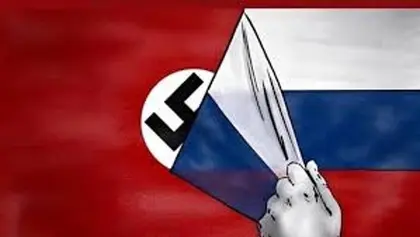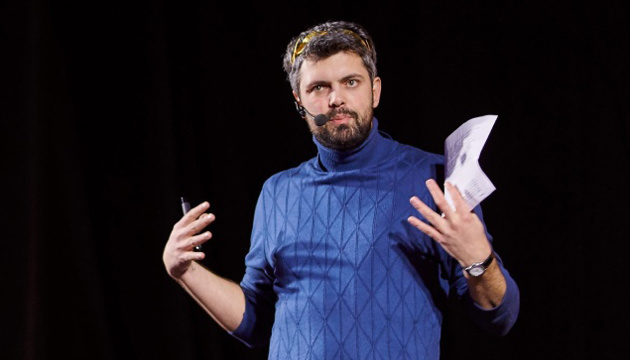Anton Drobovych, the head of Ukraine’s Institute of National Memory and now a soldier of the 112th Brigade of Territorial Defense of Kyiv, has given an interview to Ukrainska Pravda in which he shares his view on the difference between Russian fascism, Italian fascism, and German Nazism; and what victory and freedom mean for Ukrainians.
Drobovych characterizes modern Russia as a “fascist neo-imperial state.”
JOIN US ON TELEGRAM
Follow our coverage of the war on the @Kyivpost_official.
The contemporary Russian regime, he argues, is similar to Italian fascism and German Nazism. However, there is a difference: 2
Contemporary Russian fascism is grounded in a complex composite tradition that has lasted for many decades, if not longer, beginning with the tsarist imperial autocracy. Therefore, it has become more deeply rooted than its Italian or German antecedents.
Russian culture, according to Drobovych, has to a large degree developed as an imperialistic one with fascist elements. Such features also appeared from time to time in other countries, but, eventually, they were seen as unacceptable and expurgated. Not so in Russia.
In Germany after World War II, culture and political life were purified through individual catharsis or collective condemnation and redemption. But not in Russia, he emphasizes, where the Russian tsarist imperial system was supplanted by Leninism, Stalinism and communist totalitarianism.
Imperial and fascist elements accumulated and superimposed themselves on each other, eventually reemerging under Vladimir Putin into a massive rapacious monster ideology with deep roots that not only suppresses its own people but threatens others beyond Russia’s borders.

Moscow Prime Suspect for Sabotage Aimed at Disrupting Olympic Games
The Ukrainians have been forced to assume the role of the gardener seeking to eradicate this malign expansive growth. “Unfortunately, it must be done at the cost of our blood,” the author continues.
Will the Russians themselves finally realize that they need to cleanse themselves of the fascist curse that has cast its spell over them? It’s not at all clear, Drobovych concludes. The Germans managed to do so, but in his view they are “a different people.”
A significant part of the interview is devoted to the concept of victory.
“Victory can have different modalities and shades,” Drobovych says. “For some, returning a loved one from the front is already a victory. For others, it is a return to the house that they left after February 24.”
For Drobovych himself it’s at least the restoration of the territorial integrity of Ukraine within the borders of 1991. This will minimize further threats from the Russian Federation.
He also ponders about the issue of national identity formation. In particular, he dwells on how his identity was formed and what in particular influenced it the most.
“Identity is always about comparing ‘us’ and ‘others.’ For the first time, the question ‘who are we?’ appeared to me while at university. First, through the distinction of ‘we’ and ;they’. And eventually, through the study of historical, literary and philosophical texts.”
Drobovych admits that his family strongly influenced his identity; it was anti-Soviet.
According to him, the most vital thing for Ukrainians today is the appreciation of the incredible value of freedom.
“Freedom is the cultural code of the Ukrainian nation. The war has finally shown it,” he explains. “Even many pro-Russian people who grew up in Ukraine were outraged by the disregard for humanity they encountered from the military boot of the Russian Federation.”
Drobovych nevertheless believes that many Ukrainians still do not fully understand the concept of freedom and its importance. Some of them still hesitate because the Russian rockets have not hit their house or destroyed their home or loved ones.
Censorship during the Soviet and earlier period distorted the historical memory of Ukrainians including that of what occurred during World War II. The Ukrainian government and society are still having to undo the damage done.
We need the truth about the current war with Russia, too, and it will become available when victory is achieved, Drobovych says confidently. In the meantime, Ukrainian society has to persevere with an element of censorship and self-censorship which wars impose.
The main thing, he stresses, is to maintain a proper balance. “We should not stoop to pseudo forms of remembering and patriotism, as they do in Russia.”
See the original interview published on 9 Sep. here.
You can also highlight the text and press Ctrl + Enter







